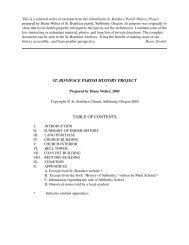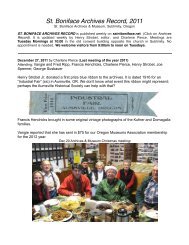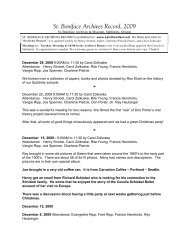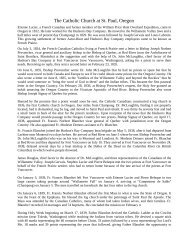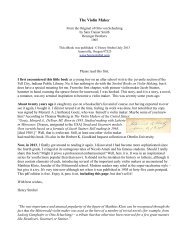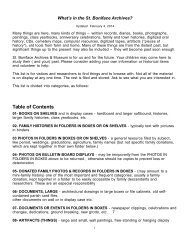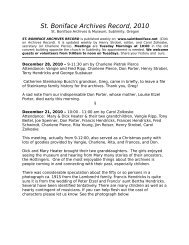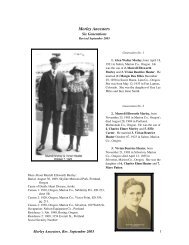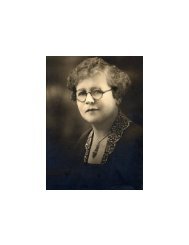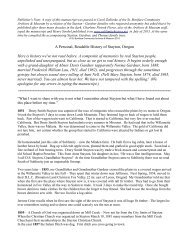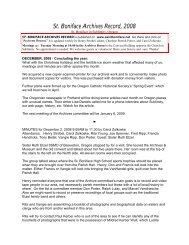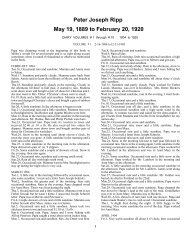St. Boniface Archives Record, 2012 - Henry Strobel & Sons
St. Boniface Archives Record, 2012 - Henry Strobel & Sons
St. Boniface Archives Record, 2012 - Henry Strobel & Sons
You also want an ePaper? Increase the reach of your titles
YUMPU automatically turns print PDFs into web optimized ePapers that Google loves.
For more than twenty years as an on-the-road TV reporter for Portland's KATU, Pat Wilkins<br />
traveled the highways and backroads of Oregon in a quest to find the people, places, and<br />
history that make the state so special. Now thirty of his favorite stories are collected in<br />
Somewhere in Oregon. Wilkins' stories range all across Oregon, and along the way he<br />
introduces readers to, among other things, a cave-dwelling family and frog-jumping<br />
contests, to the man who invented erector sets and a boy who's a champion buckaroo, to a<br />
dog that stood trial and a cat that owned a city hall-even to the death of his friend, former<br />
governor Tom McCall. $12.95 Trade Paperback<br />
(<strong>Henry</strong> has ordered a copy for the <strong>Archives</strong>.)<br />
Don Porter brought in a booklet, Annual of the Church of Christ, <strong>St</strong>ayton, Oregon 1881 –<br />
1981, 100 Years of History of the <strong>St</strong>ayton Church of Christ, written by his cousins, Beverly<br />
and Donna Fisher. It's a fascinating detailed history of the church and its members,<br />
whose descendants will enjoy perusing this copy in the <strong>Archives</strong>.<br />
Don Porter also brought in an obituary for local historian Daraleen Wade; he will check<br />
with Doug Fisher about Daraleen's books.<br />
April 10, <strong>2012</strong> by Charlene Pierce<br />
Attendees: Francis Hendricks, Don Porter, Charlene Pierce, <strong>Henry</strong> <strong>St</strong>robel, Elmer Etzel, Carol<br />
Zolkoske, Ray Heuberger and guests, Ken and Joy Krumdieck of <strong>St</strong>ayton.<br />
Carol is planning to go to the OCHS Spring Event and also to the event sponsored by the state on<br />
archiving, on April 26, 27 and 28.<br />
Vangie left a letter regarding the Silver Falls Event on July 14 and 15. We plan to be putting together<br />
some exhibits to take to this. Elmer Etzel has some photographs of Silver Falls that he took many<br />
years ago and we may be able to include these in our exhibit.<br />
Elmer Etzel said that Virgil Palogy (sp?) is going to be showing a book of his life in the Marines at the<br />
Lakeside facility in <strong>St</strong>ayton on April 15 th at 2:00. Free coffee and cookies.<br />
Elmer talked about his training at the Portland School of Music on the G.I. Bill following WWII (Navy)<br />
and a little about his musical career. It wasn't just a music school; students were required, to get a<br />
degree, to take other classes such as English and History. The school was operated by some of the<br />
most famous performers and teachers in the world of music. Ariel Rubstein, the director, had been a<br />
concert pianist who for many years had performed all over the world. He taught piano and voice.<br />
http://www.nytimes.com/1997/06/23/nyregion/ariel-rubstein-97-a-classical-pianist.html?_r=1<br />
§<br />
Eugene Deurste had conducted operas in Europe and North and South America. He taught theory,<br />
harmony composition and ear training. Both were educated in the prestigious Conservatory Russia at<br />
the school in Moscow. Elmer talked about one of his instructors, Mr. Beecher, who taught piano and<br />
composition and Gregorian Chants.<br />
Elmer wrote a four part harmony for choir Mass and “got a good grade on it.” He also talked about his<br />
time playing with the Baker Boys. Elmer's primary instrument is the clarinet, but he plays many, and<br />
earlier entertained with his band in the Salem area on accordion. His clarinet instructor in Portland was<br />
Albert Klingler, the first choir player in the Portland Symphony Orchestra, who played at the Hollywood<br />
Bowl in the summer when the symphony was idle.<br />
He spoke of the black discrimination that he was aware of. He knew a man who played the clarinet,<br />
but was not allowed to play certain classical compositions or in the symphonic orchestra. “The most



